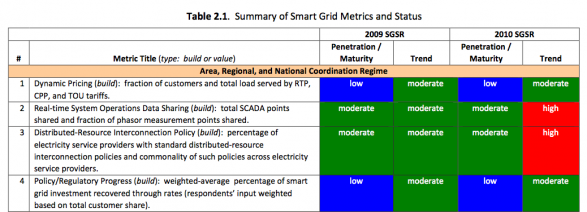We’ve all heard the smart grid story. Digital communications networks will manage and monitor advanced electrical functions: integrating large quantities of distributed generation, shifting and scheduling demand loads, and dynamically pricing electrical delivery. The grid will be better able to balance the variability of renewables like wind and solar. Consumers will modify electricity use; we’ll be able to recharge electric vehicles at night. And so on.
The U.S. Department of Energy’s “2010 Smart Grid System Report” (published February 2012) includes an informative status report on 21 metrics of progress.

Recent setbacks reported in the media include California counties banning smart meters and weak venture capital support for smart grid companies. A 2012 Deloitte study of “Insights into Emerging Trends of Energy Customers” (pdf) finds mistrust of utilities among consumers.
Perhaps it should come as no surprise then that a Pew Research Center’s Internet & American Life Project survey of tech analysts on “The Future of Smart Systems” reports mixed expectations. The fascinating findings were released over the summer — but only recently caught my attention.
The survey offered two contrasting visions:
By 2020, the connected household has become a model of efficiency, as people are able to manage consumption of resources (electricity, water, food, even bandwidth) in ways that place less of a burden on the environment while saving households money. Thanks to what is known as “smart systems,” the Home of the Future that has often been foretold is coming closer and closer to becoming a reality.
By 2020, most initiatives to embed IP-enabled devices in the home have failed due to difficulties in gaining consumer trust and because of the complexities in using new services. As a result, the home of 2020 looks about the same as the home of 2011 in terms of resource consumption and management. Once again, the Home of the Future does not come to resemble the future projected in the recent past.
51% agreed with the former, 46% with the latter. Most of the written responses were skeptical of the smart system future.
With these contrasting visions focused squarely on the consumer, the system boundary for this survey is different from that of, say, the DOE metrics. This difference becomes clear in some of the written responses. For example, Nokia’s Tracy Rolling: “My iPhone won’t want to talk to my GE smart toaster and my Bosch smart refrigerator won’t connect to my generic smart coffee maker.” Thus, I might still want a smart grid and not want the vision that Rolling describes.
A couple responses of note:
Mike Liebhold: People have simply too much to do already to focus scarce attention on properly managing their resource consumption in fine detail. Also, people seem to resist the idea as invasive of smart grid top-down monitoring and control of resource consumption. Conservation technologies are promising, but behavior changes will be very slow.
Jerry Michalski: A few years back, BMW and Mercedes Benz had to turn off some of the onboard electronics on their high-end cars because complexity gremlins were making things break. Those are smart German companies that one assumes have a lot of control over their components and their software. Diabetic Jay Radcliffe recently hacked into his own wirelessly enabled insulin pump, changing his dosage. The Internet of Things and the subsequent world of smart systems, from smart cars and smart highways to smarter cities and smart homes is mostly overblown, and, in fact, poses a significant risk of creating overwhelming complexity, which could take down the Internet we now have. It also opens the door to hacking scenarios we seem to not want to contemplate. Every security technology becomes obsolete. If we connect all these new things and expose them to external control, you can bet some of the forces controlling them won’t be the designers or owners. As these connected devices age, they’ll just become more vulnerable. Imagine also the court cases of people hit by autonomous vehicles, for example. I see our ‘smarter world’ much as I see genetically modified organisms right now: very powerful technologies that could do a lot of good but are being implemented poorly.

